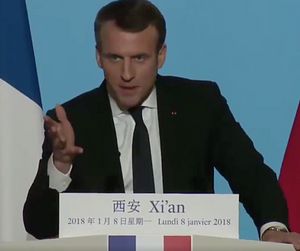French President Emmanuel Macron is currently in China for a state visit. It is also his first visit to China since he took office.
Interestingly, rather than Beijing, he chose Xi’an — the capital city of Shaanxi Province in central China — as his first destination.
During an exclusive interview with China.org.cn ahead of his trip, Macron explained the reasons behind this decision. He said:
I’m very aware of the mutual fascination that ties China to Europe, woven along the ancient silk routes that connected Xi’an to the eastern Mediterranean. Our relationship is anchored in time, and in my opinion is based on civilization, in the sense that France and China are two countries with very different cultures but which both have a universal calling. They are two countries that have always been eager, across distances, to meet and recognize each other. It’s for all these reasons that I wanted to start my state visit in Xi’an – it’s a way to experience ancient China.
Obviously, Macron has done his research. As Macron noted, Xi’an, marking the ancient Silk Road’s eastern end, was the capital of multiple dynasties — including the Zhou, Qin, Han, and Tang — in ancient China’s history. The Tang dynasty (618–907) , in particular, has been widely regarded by most Chinese people as the golden age for Chinese civilization, when Xi’an (then called Chang’an) was the most populous and prosperous city in the world. Now China’s leaders have been repeatedly calling for China’s rejuvenation. To some degree, a modern-day “grand Tang prosperity” is what those leaders aim to achieve, and it’s also why Chinese President Xi Jinping has been actively pushing forward his signature policy — the Belt and Road Initiative (BRI), a modern-day Silk Road project.
Thus, Macron’s decision to start his trip in China from Xi’an is actually a very smart move. It both demonstrated his appreciation for Chinese culture and sent a message to Xi that France is ready to fully embrace the BRI.
Macron also made his stance about the BRI clear during his interview with Chinese media. He said that he is convinced that the BRI can “play a major role in structuring the Eurasian region and that it represents a real opportunity to create bridges, through exchange, between countries and civilizations, just as the ancient silk routes once did.”
“I think it’s very important that Europe and China strengthen their collaboration on the initiative. France is ready to play a leading role in this. We must identify concrete projects to implement together in Europe, in Asia and in third countries,” he added.
It’s also worth noting that during his stay in Xi’an, Macron visited the Wild Goose Pagoda, a Buddhist pagoda built in 652 during the Tang dynasty. Although the site is well-known in China, Reuters noted that it’s “a virtually unknown landmark in the West.”
According to the Elysee Palace, Macron decided to visit the site after discussion with China specialists and considered this location to be particularly special when compared to the Terracotta Army, also located in Xi’an.
Given the fact that three French ex-presidents — Francois Mitterrand, Jacques Chirac, and Nicolas Sarkozy — had all visited the Terracotta Army during their trips to China, it seems that Macron wanted to display his special knowledge about Chinese history. Reuters commented that “France’s youngest leader since Napoleon has shown his willingness to use symbols and history to win over his global counterparts.”

































